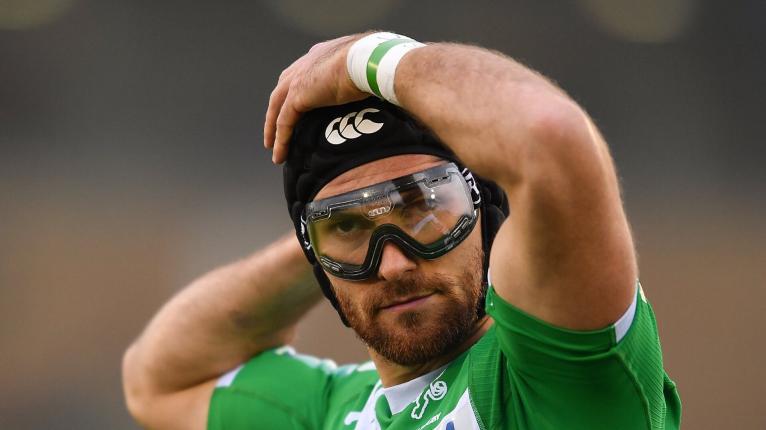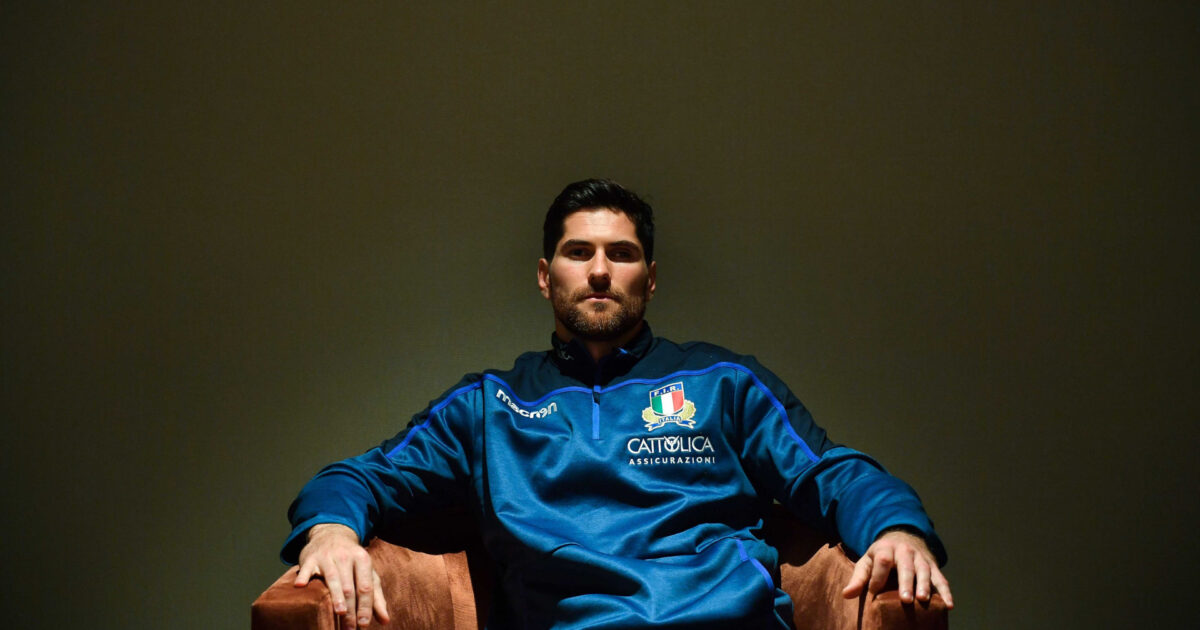'That's the uglier side of the sport in some ways... but there is no animosity'

PRO14’s fixtures computer will have a cruel laugh at the expense of Ian McKinley next Friday. Handed his P45 by Benetton earlier this year, McKinley came home to Ireland post-lockdown to start a new chapter in his life, to freshen the mind and take stock after an incredible decade where he went from getting blinded in one eye and retiring to coming back and representing Italy – his adopted country – at Test level.
The irony surrounding the start of the new 2020/21 season is that McKinley’s old Treviso club – making their first trip outside Italy since March when McKinley was with them on a visit to Newport – will play Ulster in Belfast, the city just 36 miles away from where 30-year-old has lain his hat in Bellaghy, Co Derry.
Having clocked up nine caps for the Azzurri and represented Benetton 67 times in four seasons, you would have thought that McKinley was of a modest enough age where he had a number of good years ahead of him at the top of the game in Italy.
Club boss Kieran Crowley thought differently, though, leaving the Dubliner’s career caught up in a limbo that is unlikely to clear any time soon given the financial ravages of the coronavirus on the sport. McKinley’s not one to hold a grudge, however, his eyesight adversity teaching him way back that it’s best not to get dragged down by life’s setbacks.
Asked by RugbyPass what it was like to hear the bad news delivered by Crowley that he was no longer needed at Stadio di Monigo, McKinley said: “Obviously they are not very pleasant conversations but that happened pretty early on (in the season) so I’d known for quite a while.
https://www.instagram.com/p/CDJFXOtqBSd/?igshid=y7t0od04nprx
“It’s a double-edged sword and that’s the other side of the sport, the uglier side in some ways. Like everyone who is involved in it, you’re in it for both reasons (good and bad). Sometimes that is just the hand that you are given and this can happen at any time, so there is no animosity in any way.”
Rugby was still in full flow when McKinley learned his future wasn’t in Italy. Then the world changed and his options were squeezed, eventually resulting in the decision to up sticks and move to the northern part of Ireland where his wife Cordelia hails from.
McKinley’s not lost to rugby completely. He has taken up a coaching post at Ballymena Academy, a school 15 miles away from his new home at the top of Lough Neagh, activity since supplemented by other coaching at All-Ireland League Division 2A club Rainey Old Boys who are only a few miles away in the other direction.
He won’t play – it was in the All-Ireland league all those years ago when he took the stud that ruined the vision in his left eye. But he is training away, still working out in the hope that a call might eventually come to ensure his last professional player appearance wasn’t a cold March night six months ago in Wales.
“The pandemic has thrown a massive spanner in the works,” he admitted. “I suppose there were talks with various people but the coronavirus, there was just no sort of guarantees. You saw the best example of the situation in Leicester. You had contracts and guys were not actually guaranteed of anything.
“Even looking at the Premiership now saying there are no spectators for six months, you’re looking at Premiership clubs that are going to struggle economically… and you can even look at someone like Rob Kearney who has had a glittering career and has just retired (from playing in Ireland). He didn’t get the send-off that he probably deserved for his service to rugby.
“It’s very rare for sportspeople to get their perfect send-off, but who knows exactly what is going to happen? That’s just the difficult thing at the moment, that there is just so much uncertainty with teams and no one is in control of anything. In such unprecedented times, it was a good time to take stock and move closer to family and friends. It gives the body and the mind a little break because it has been ten years of craziness, to be honest with you. That was the thinking behind it.
“Who knows,” he continued when asked if his famous goggles have been hung for good and he has played his last match. “I’m in no position to say. I’m not willing to say any comment on that. If people said six months ago there was going to be a global pandemic, a Covid that basically shuts down the whole world, most people would have thought you were crazy, so you just don’t know what is going to happen. I’m just happy at the moment being with family and friends, taking a step back and reflecting on things.”
https://www.instagram.com/p/CBntN4_K3vX/
The end in Italy was rough for McKinley. “We were trapped in our apartment for probably about two and a half months with the 200-metre rule and going no further than that… it certainly was scary times. Just the uncertainty, the unknown for a lot of people and the fact of not being able to go further than a certain distance from where you were living and shops being closed and all that, how you could walk on the main streets, the main roads without any traffic.
“It certainly was pretty eerie but myself and my wife were pretty lucky that we didn’t have any kids. I can imagine if you did have kids and you were living in an apartment or in the city centre it would have been an absolute nightmare, so we counted ourselves pretty fortunate.
“We’re back now about two and a half months in Northern Ireland. Everyone here has been really friendly and welcoming. I’m working with one club and one school that are pretty local to where I’m living. It’s sort of nice going back to grassroots rugby, but the Covid is affecting that.
“The fact you can’t even change in changing rooms: you have guys that are coming from work or from university or whatever and they are just having to be changed or change in the boot of their car and then just leave straight away so certainly things are different.
“Not having spectators at games, or a limited amount, and having to wear masks, it certainly different but I’m really enjoying it. I have been welcomed pretty well and slagged at the same time which is good, it makes you feel part of the set-up.
We are delighted to welcome former Italian International rugby player, Ian McKinley to the coaching team at Ballymena Academy for the incoming season.
Benvenuto a Ballymena Academy!@ianmck7 pic.twitter.com/76ToDP6aHt
— Ballymena Academy (@ballymenaacadem) August 27, 2020
“Of course there are some things you miss about Italy. Food, wine, coffee are pretty much up there. When you have wine that is cheaper than water you’re in a pretty good spot. I suppose the difference in climate, there is a big temperature drop, that is probably the biggest difference, but who knows the future holds. We would love to go back there. It is definitely my other home and I would in the future one day like to maybe get back. We’ll wait and see.”
Whatever transpires, McKinley has a treasure trove of memories to reflect on, the highlights being his first match at junior level in Italy wearing the goggles in 2014 and then making his Test debut for Italy in 2017 against Fiji in Catania. “Two very different levels but still the same significance,” he enthused.
“I have got all my jerseys and everything, I have everything just in bags at the moment. I haven’t even unpacked from Italy. But I definitely still like having the stuff. I still have Gaelic jerseys from when I was nine years old, so definitely all those memories stand out.”

What will endure more than any memorabilia, however, is McKinley’s legacy to the rugby, how his determination to exit retirement and play wearing goggles forced the authorities to alter its rules on eyewear. It’s rare a week goes by now that he doesn’t receive a note of thanks from a player or a parent, delighted that McKinley’s stubbornness to play opened up the sport to a section of people previously excluded.
“There are over 2,000 people around the world that are registered to play with these goggles. That is the part that still for me is astonishing, you still get messages weekly or at least every couple of weeks saying they have a similar problem or that they are using the goggles how. Above everything else that is the part that brings the most satisfaction, that other people are getting use out of them,” he said, adding how his story about overcoming disability is something he won’t ever get tired of telling.
https://www.instagram.com/p/BbaRO9ag-_J/
“My friends are sick and tired of hearing about it,” he jested at his own expense. “But if someone who hasn’t heard about it takes something from it, that gives me satisfaction in it. I’m not at all (jaded by it). If people are interested in it I’m happy to share it. The interesting part of it is it’s not a one-dimensional story.
“You have different avenues to it and it just depends on what people are looking for. Some people are more interested in the rehabilitation stage, some are more interested in the technical side, the mental side. It depends on what people are looking for.
“The mental side is the most important part, probably an area (in rugby) that needs to be looked at a bit more, probably trained a bit more. It’s definitely the hardest part for any athlete. Maybe having the bit between the teeth and maybe not arriving at the place you wanted to get to, that is probably what drove me, but everyone has their own motivation.
“I don’t think people know until they are put into awkward, difficult situations what they are capable of. I always say I was lucky to have the people around me that picked me up when I needed the pick-up and you’re forever grateful. You realise when you get into those tricky situations it’s all the people who were there for you that continue to inspire.”
Those people that championed McKinley the most are now with him on the big screen, the story of how he was able to forge a professional career in Italy despite blindness in one eye being turned into a 70-minute movie, Look Beyond. “It premiered probably a year ago in Italy in four different cities and came out maybe six months ago on Amazon Prime.
“It gives an insight into my family life. They basically followed me and my wife for six months and it sort of summed it up nicely. The good thing about it is that you actually don’t need to understand anything about rugby. The point of the story is a lot bigger than that and there was some positive feedback, so that was always nice.”
Great to meet the Cardiff Visually Impaired rugby team after our game last night against the Blues. You guys are a tribute to the sport and hopefully we will meet again soon??#cardiff #blues #virugby #community #trailblazers #ability #inclusion https://t.co/cZrMP4eYSW
— Ian McKinley (@ianmck7) February 24, 2020
























































